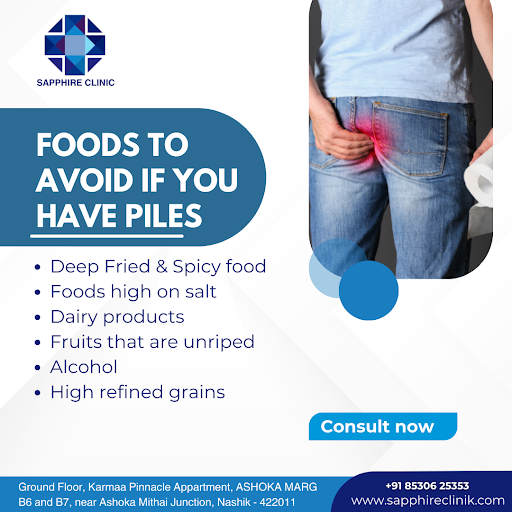Piles, or hemorrhoids, are a common condition that can cause significant discomfort. One of the most effective ways to manage piles is through diet, as certain foods can exacerbate the symptoms. Dr. Abhinandan Jadhav from Sapphire Superspeciality Clinic shares a list of foods to avoid if you have piles, helping you manage your condition better.
1. Deep Fried & Spicy Food
Deep-fried and spicy foods can irritate the digestive system and worsen inflammation in the anal region. These foods can also lead to constipation, which increases strain during bowel movements, aggravating piles symptoms.
2. Foods High in Salt
Excessive salt can cause fluid retention and lead to swelling, which can worsen the discomfort associated with piles. Processed and canned foods often contain high amounts of sodium, so it’s best to limit their intake.
3. Dairy Products
Dairy products, especially full-fat milk, cheese, and ice cream, can contribute to constipation and make bowel movements more difficult. This can increase pressure on the hemorrhoidal veins and cause further discomfort. Opt for low-fat or non-dairy alternatives if you’re sensitive to dairy.
4. Unripe Fruits
Unripe fruits, such as bananas, can be difficult to digest and can lead to constipation. Ripe fruits, on the other hand, are rich in fiber and can help prevent constipation. It’s important to focus on well-ripened fruits like bananas, apples, and pears to aid digestion.
5. Alcohol
Alcohol is a diuretic, which can lead to dehydration and make stools harder, contributing to constipation. Dehydration can also reduce the blood flow to the affected area, potentially aggravating the pain and discomfort of piles. It’s best to limit or avoid alcohol while managing piles.
6. High Refined Grains
Refined grains, such as white bread, pasta, and rice, are low in fiber and can lead to constipation. Fiber helps keep bowel movements regular and soft, reducing the strain during defecation. Switch to whole grains like brown rice, whole wheat bread, and oats for better digestion.
Conclusion:
Managing piles requires a combination of proper treatment and dietary changes. By avoiding the above-listed foods and incorporating more fiber-rich foods, water, and healthy fats into your diet, you can reduce the symptoms and discomfort of piles.
For personalized advice and treatment for piles, visit Dr. Abhinandan Jadhav at Sapphire Clinic in Nashik. With expert care and guidance, you can manage your condition and improve your quality of life.


